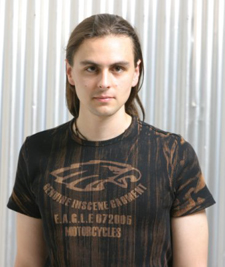Kemal Akman
When Kemal Akman joined the Three Hundred he said:
Different than animals, every human has a choice in making long-term predictions and thus decisions. No reason exists why the disciplined human mind could not ultimately control anything imaginable which it fully comprehends, including its own nature. As people can and do increasingly create knowledge and values to experience earned prosperity and life, they may extend their biological lives by new technologies with no theoretical or proven ultimate limit. All essential advances of our past and present culture have been deeply entangled with the basic goal of extending quality and quantity of life, in the form of business, science and art.
The sole possibility of the endeavor of radical life extension, beginning with the remediation of degenerative diseases, makes it a primary moral imperative for humanity. Hence, it must be carried forward unstymied by ambitions of repressive lobbyism and politics or fundamentalist religions to force any individual what she may or may not do with his/her body. It should also not be discouraged by conservative science regarding feasibility, especially since most critique reduces often to speculative and unfounded pessimism, camouflaging deathist traditionalism. As long as theoretically feasible, a most radical and ambitious schedule is important. Even if any schedule particulars should turn out to be too optimistic, each successful step toward the high goal of eliminating aging-related disease and death will have major impacts on many lives.
Kemal Akman,
also known as Mixter, is
Senior Developer and Security Architect for Public Key Infrastructure
for
Ciphire Labs AG, Germany/Switzerland. He is
a computer security professional focused on
security research in the areas of cryptography, secure network protocol
design and distributed computing, vulnerability research and emerging
information technologies. Since his ‘99 proof-of-concept
implementations on Distributed Denial Of Service and security-contest
winning white paper
Protecting Against The Unknown, he has worked
closely with the IT security community.
Kemal has authored
Automation Potentials in the Realm of IT Security,
Automating security processes: the Network Exploit Automation
Tool (Program),
Peer-to-Peer and the future of distributed applications,
Guidelines for C source code auditing,
Learn C in a day, Free Tutorial,
Raw Sockets Programming Tutorial,
Paranoia Vs. Transparency And Their Effects On Internet
Security,
Writing buffer overflow exploits,
and
Cracking (network intrusion) FAQ.
He authored the
Six/Four System which is a flexible framework consisting of
a
formally
specified Peer-To-Peer protocol. This protocol is best described as a
trust-enhanced anonymous tunneling protocol, and meant to provide
people with anonymous, secure access to the public.
He authored the
Intrusion Detection Evasion System, a proof-of-concept
attack
against
packet-based Network Intrusion Detection
He coauthored the
Network Security Analysis Tool, a widely-used flexible
vulnerability
assessment and penetration testing tool with comprehensive features.
Read the full
list of his public software projects.
Kemal is a
member of
De:Trans, the German transhumanist association and is a
founding member of the
German Biostasis Foundation (Deutsche
Gesellschaft für Angewandte Biostase e.V.).
He is working with
Hacktivismo, a non-profit research and development
group for human-rights and freedom advancing infrastructures and
technologies, since 2000, and now as main coordinator.
Kemal
has worked on IDS design and
engineering, vulnerability management and a large-scale applied
cryptography/public key infrastructure project released in 2005. He
has also
issued over ten white papers as well as articles for German computer
magazine c’t, and spoken at conferences including HOPE2002, HAL and
CanSecWest. He is fluent in German and English and knows some Spanish
and Hebrew. Read his blog Alpha Point.





